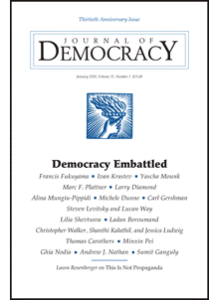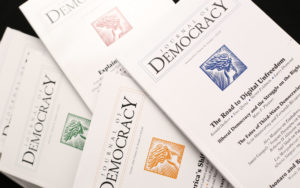 The thirty years since the end of the cold war have been a time of extraordinary change, notes Jessica T. Mathews, a Distinguished Fellow at (and former President of) the Carnegie Endowment for International Peace. Five profound transformations—globalization, China’s meteoric rise, the spread of terrorism, the dawn and epic growth of the digital age, and the retreat of democracy and international rise of populism—have been crammed into a brief period, together with the upheaval of the Iraq war and its aftermath and the 2008 global financial crisis.
The thirty years since the end of the cold war have been a time of extraordinary change, notes Jessica T. Mathews, a Distinguished Fellow at (and former President of) the Carnegie Endowment for International Peace. Five profound transformations—globalization, China’s meteoric rise, the spread of terrorism, the dawn and epic growth of the digital age, and the retreat of democracy and international rise of populism—have been crammed into a brief period, together with the upheaval of the Iraq war and its aftermath and the 2008 global financial crisis.
Such changes demand fresh thinking about how much of an international burden the US should shoulder if it also wants to meet its domestic needs, protect its security interests, and sustain the values it cares about, she writes for the New York Review of Books:
[Former Vice-President Joseph] Biden proposes a global “Summit for Democracy” to be held in his first year. This was an unworkable idea when it was discussed during the Clinton administration and seems even less well suited to today’s world, beginning with the vexing question of who decides what countries qualify as democracies in order to be invited—Turkey? Brazil? Hungary? the Philippines?—and what happens to US policy toward those that aren’t included.
There is, in short, no going back to the status quo ante, Mathews insists.
 If Mathews wants fresh thinking she will find it in the latest issue of the NED’s Journal of Democracy:
If Mathews wants fresh thinking she will find it in the latest issue of the NED’s Journal of Democracy:
- Alina Mungiu-Pippidi charts the rise of anticorruption norms and the pitfalls of good-governance interventions;
- Carl Gershman identifies the six urgent priorities for bolstering democracy assistance;
- Thomas Carothers argues we must rethink how democracy support fits in a turbulent world.
The Cato Institute will be hosting a panel discussion on January 28, The Future of Progressive Foreign Policy: 2020 and Beyond, featuring Kate Kizer from Win Without War, Loren DeJonge Schulman from the Center for a New American Security, Dan Nexon from Georgetown University, Adam Mount from the Federation of American Scientists, and Mena Ayazi from the Alliance for Peacebuilding. To provide perspective for the discussion, an article published in the November/December issue of the German magazine, Internationale Politik, identifies three broad clusters – traditional liberal internationalist, millennial liberal internationalist, and progressive.







